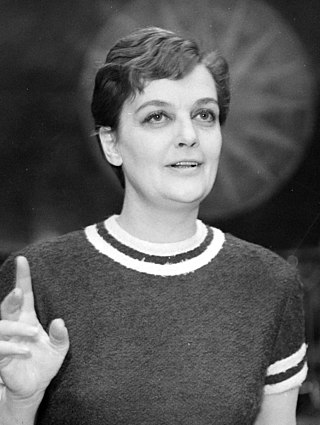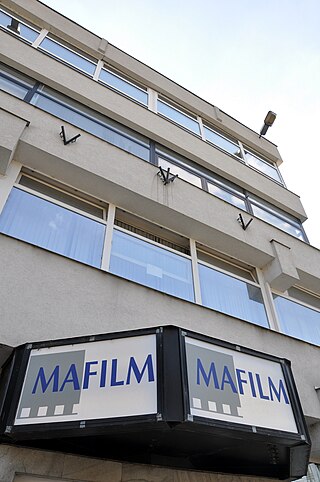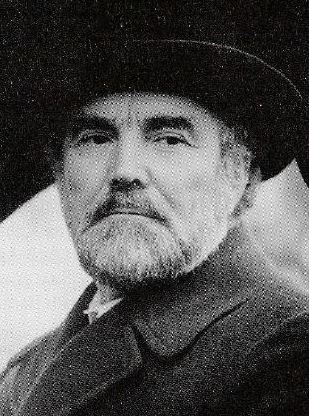
Iván Verebély was a Hungarian actor and comedian. He played in Miskolci Nemzeti Színház, Nemzeti Színház, and in Vidámszínpad.

Kata Dobó or Kata Dobo is a Hungarian actress and filmmaker.

Klári Tolnay was a Hungarian actress. She received the Kossuth Prize in 1951 and 1952.

Judit Elek is a Hungarian film director and screenwriter. She directed 16 films between 1962 and 2006. Her film Mária-nap was screened in the Un Certain Regard section at the 1984 Cannes Film Festival.

Attila Csaba Fiola is a Hungarian professional footballer who plays as a right-back for Fehérvár FC and the Hungary national team.

Mezőkövesdi Sport Egyesület is a football club located in Mezőkövesd, Hungary. The team's colors are yellow and blue. The team name comes from the Zsóry family who founded the thermal baths that brought wealth to the town.

Mafilm was established in 1948. It has been the largest and most significant film studio in Hungary and a strategic base for the Hungarian film industry. Mafilm's history has seen days of glory, just as it has survived severe agonies. The roots of its birth go back to Kolozsvár, and its ancestors include Europe's third-largest silent film factory. Ever since Korda Sándor founded the predecessor of Mafilm, film production has been going on uninterrupted. The importance of the place is also enhanced by the fact that there are almost no Hungarian filmmakers who have not learned the basics of film profession here. Mafilm's history with its predecessors covers more than 100 years of Hungarian film history.

Ferenc Zenthe was a Hungarian actor, honored with being chosen as an Actor of the Nation, the Kossuth Prize and the Meritorious Artist Award of Hungary. Best known from the historical series A Tenkes Kapitánya and pioneering soap opera Szomszédok, he was regarded as one of the great talents of his generation.

Endre Kukorelly is a Hungarian writer, poet and journalist. He is a teacher of the Hungarian University of Fine Arts. He was also an editor of the Magyar Narancs.
The National Academy of Handball is a Hungarian state-funded handball training and developing center run by the Hungarian Handball Federation. Located in Balatonboglár, it offers an integrated four year education for students in grades 9–12. In addition, it is open for Hungarian international junior handballers under a trilateral agreement between the academy, the players' club and the players itself.
Dávid Miklós Sigér is a Hungarian professional footballer who plays as a midfielder for Fehérvár and the Hungary national team.

Zoltán Zubornyák is a Hungarian actor, culture manager, theatre manager, director, volunteer, art director.
András Gáspár is a Hungarian actor, editor and presenter.
The 2017–18 season was Videoton Football Club's 49th competitive season, 18th consecutive season in the Nemzeti Bajnokság I and 76th year in existence as a football club. In addition to the domestic league, Videoton participated in this season's editions of the Magyar Kupa and UEFA Europa League. The club won its third league title this season, two points ahead of closest challenger Ferencváros.
The COVID-19 pandemic in Hungary was a part of the worldwide pandemic of coronavirus disease 2019 caused by severe acute respiratory syndrome coronavirus 2. On 4 March 2020, the first cases in Hungary were announced. The first coronavirus-related death was announced on 15 March on the government's official website.

Attila Bartis is a Romanian-born Hungarian writer, photographer, dramatist and journalist. He received the Attila József Prize in 2005. His books have been translated into over 20 different languages. In 2001, he published his second novel, Tranquility, which was adapted into film in 2008. In 2017, he became a member of the Széchenyi Academy of Literature and Arts.
The 2020–21 Nemzeti Bajnokság I, also known as NB I, is the 122nd season of top-tier football in Hungary. The league was officially named OTP Bank Liga for sponsorship reasons. Ferencváros were the defending champions.

Margit Bangó is a Hungarian singer and entertainer.

Lilla Polyák is a Hungarian actress and singer.

KatarinaDurica is a writer, journalist, and member of the Society of Hungarian Authors.













